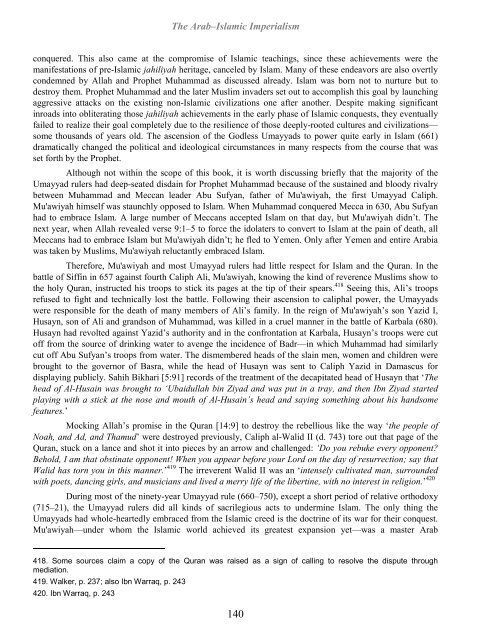islamic-jihad-legacy-of-forced-conversion-imperialism-slavery
islamic-jihad-legacy-of-forced-conversion-imperialism-slavery
islamic-jihad-legacy-of-forced-conversion-imperialism-slavery
- No tags were found...
Create successful ePaper yourself
Turn your PDF publications into a flip-book with our unique Google optimized e-Paper software.
The Arab–Islamic Imperialismconquered. This also came at the compromise <strong>of</strong> Islamic teachings, since these achievements were themanifestations <strong>of</strong> pre-Islamic jahiliyah heritage, canceled by Islam. Many <strong>of</strong> these endeavors are also overtlycondemned by Allah and Prophet Muhammad as discussed already. Islam was born not to nurture but todestroy them. Prophet Muhammad and the later Muslim invaders set out to accomplish this goal by launchingaggressive attacks on the existing non-Islamic civilizations one after another. Despite making significantinroads into obliterating those jahiliyah achievements in the early phase <strong>of</strong> Islamic conquests, they eventuallyfailed to realize their goal completely due to the resilience <strong>of</strong> those deeply-rooted cultures and civilizations—some thousands <strong>of</strong> years old. The ascension <strong>of</strong> the Godless Umayyads to power quite early in Islam (661)dramatically changed the political and ideological circumstances in many respects from the course that wasset forth by the Prophet.Although not within the scope <strong>of</strong> this book, it is worth discussing briefly that the majority <strong>of</strong> theUmayyad rulers had deep-seated disdain for Prophet Muhammad because <strong>of</strong> the sustained and bloody rivalrybetween Muhammad and Meccan leader Abu Sufyan, father <strong>of</strong> Mu'awiyah, the first Umayyad Caliph.Mu'awiyah himself was staunchly opposed to Islam. When Muhammad conquered Mecca in 630, Abu Sufyanhad to embrace Islam. A large number <strong>of</strong> Meccans accepted Islam on that day, but Mu'awiyah didn’t. Thenext year, when Allah revealed verse 9:1–5 to force the idolaters to convert to Islam at the pain <strong>of</strong> death, allMeccans had to embrace Islam but Mu'awiyah didn’t; he fled to Yemen. Only after Yemen and entire Arabiawas taken by Muslims, Mu'awiyah reluctantly embraced Islam.Therefore, Mu'awiyah and most Umayyad rulers had little respect for Islam and the Quran. In thebattle <strong>of</strong> Siffin in 657 against fourth Caliph Ali, Mu'awiyah, knowing the kind <strong>of</strong> reverence Muslims show tothe holy Quran, instructed his troops to stick its pages at the tip <strong>of</strong> their spears. 418 Seeing this, Ali’s troopsrefused to fight and technically lost the battle. Following their ascension to caliphal power, the Umayyadswere responsible for the death <strong>of</strong> many members <strong>of</strong> Ali’s family. In the reign <strong>of</strong> Mu'awiyah’s son Yazid I,Husayn, son <strong>of</strong> Ali and grandson <strong>of</strong> Muhammad, was killed in a cruel manner in the battle <strong>of</strong> Karbala (680).Husayn had revolted against Yazid’s authority and in the confrontation at Karbala, Husayn’s troops were cut<strong>of</strong>f from the source <strong>of</strong> drinking water to avenge the incidence <strong>of</strong> Badr—in which Muhammad had similarlycut <strong>of</strong>f Abu Sufyan’s troops from water. The dismembered heads <strong>of</strong> the slain men, women and children werebrought to the governor <strong>of</strong> Basra, while the head <strong>of</strong> Husayn was sent to Caliph Yazid in Damascus fordisplaying publicly. Sahih Bikhari [5:91] records <strong>of</strong> the treatment <strong>of</strong> the decapitated head <strong>of</strong> Husayn that ‘Thehead <strong>of</strong> Al-Husain was brought to ‘Ubaidullah bin Ziyad and was put in a tray, and then Ibn Ziyad startedplaying with a stick at the nose and mouth <strong>of</strong> Al-Husain’s head and saying something about his handsomefeatures.’Mocking Allah’s promise in the Quran [14:9] to destroy the rebellious like the way ‘the people <strong>of</strong>Noah, and Ad, and Thamud’ were destroyed previously, Caliph al-Walid II (d. 743) tore out that page <strong>of</strong> theQuran, stuck on a lance and shot it into pieces by an arrow and challenged: ‘Do you rebuke every opponent?Behold, I am that obstinate opponent! When you appear before your Lord on the day <strong>of</strong> resurrection; say thatWalid has torn you in this manner.’ 419 The irreverent Walid II was an ‘intensely cultivated man, surroundedwith poets, dancing girls, and musicians and lived a merry life <strong>of</strong> the libertine, with no interest in religion.’ 420During most <strong>of</strong> the ninety-year Umayyad rule (660–750), except a short period <strong>of</strong> relative orthodoxy(715–21), the Umayyad rulers did all kinds <strong>of</strong> sacrilegious acts to undermine Islam. The only thing theUmayyads had whole-heartedly embraced from the Islamic creed is the doctrine <strong>of</strong> its war for their conquest.Mu'awiyah—under whom the Islamic world achieved its greatest expansion yet—was a master Arab418. Some sources claim a copy <strong>of</strong> the Quran was raised as a sign <strong>of</strong> calling to resolve the dispute throughmediation.419. Walker, p. 237; also Ibn Warraq, p. 243420. Ibn Warraq, p. 243140


